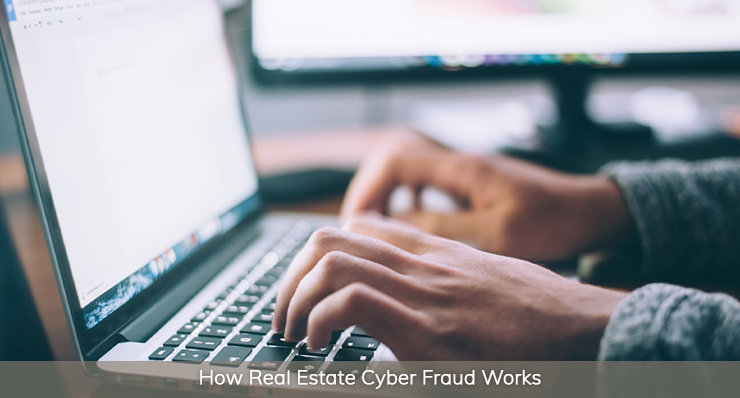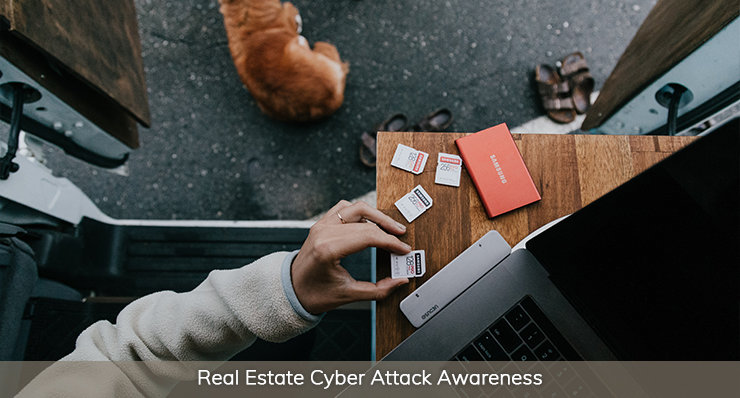
Real estate cyber threats are becoming more prevalent to the real estate industry by targeting and scamming homebuyers, sellers, and even the companies they work with. Through these scams, cyber criminals are costing people hundreds and even millions of dollars each year; and it’s on the rise.
For many people, buying or selling a home is one of the biggest transfers of money they will make in their lifetimes. Billions of dollars are exchanged in transactions each year, from down payments, to closing costs, to mortgage payoffs. This is why the real estate market is a huge opportunity for cybercriminals to scam people, and they are becoming more targeted.
Real estate cyber threats can be detrimental for real estate professionals and especially for their clients. Because real estate cyber security differs from state to state, NAR (the National Association of REALTORS®) recommends you work with an attorney licensed in your state, to help protect your sensitive information. By following our checklist, we can help you control the possibility of real estate cyber crime.
How Real Estate Cyber Fraud Works
Real estate cyber threats are on the rise. As scammers learn about the large amounts of money being moved within the real estate industry, the more they are catching on, and the more we are being targeted. When it comes to real estate, there are many kinds of cyber fraud, but the most commonly used type are data breaches, made through compromising business emails. This happens when a hacker breaks into an email account belonging to a realtor or company and then asks the client to send funds (usually to close a deal) to a fake account. Typically, by the time the victim realizes that this sum of money has been sent to an illegitimate account, the scammers have transferred it to a new, secure account and have closed the first one. Companies do not have to be invaded in order for this kind of scam to work, hackers can gain access to personal information from other sources in order to misconceive targets. Homebuyers are also not the only targets for this type of scam; so are title and escrow companies, along with any others that handle funds.
Wire transfer fraud isn’t the only real estate cyber threat that homebuyers need to be aware of; deed fraud is also on the rise within the real estate industry. This type of real estate cyber attack depends heavily on identify theft by stealing sensitive information and changing the name on titles and deeds. In some cases, these scammers sell homes that don’t belong to them, and this can lead to foreclosure, ruined credit, and huge financial setbacks. Homeowners who own more than one property are more likely to be at risk for deed fraud due to the complications of efficiently keeping track of multiple documents. Even those who inherit properties face these same risks as well, mainly because the home is not lived in or sold within a period of time, putting people at more of a risk for undetected fraud.
Real Estate Cyber Attack Awareness
With an overwhelming amount of real estate cyber threats, the most effective ways to protect yourself are with education and awareness. It is important to know who you’re communicating your sensitive information with and to know warning signs and how to identify legitimate documents and requests. This is vital when large wire transfers transfers are at stake. Even though cyber threats are becoming more prominent and destructive all the time, there are many ways to fight back. You just have to know how! Here are some effective ways homebuyers can do that:
Basic Email and Password Protection
- Do not click on unknown attachments or links. Doing this could lead to unwanted malware on your devices.
- It is encouraged to use encrypted email or a document sharing program, when it comes to sharing sensitive information with others.
- Always guard login and access information for services used within the transaction.
- Regularly go through email accounts and save important messages in a safe and secure location.
- When coming up with a password, use long and complicated ones. It is best to use phrases and a combination of letters, numbers, and symbols.
- Do not use the same passwords for multiple accounts.
- Think about using a password manager.
- Two-factor authentication is important to use when it is available as it is more secure.
- If you must do business in public, avoid public unsecured Wi-Fi.
IT Security Prevention
- Always keep firewalls and software active and up-to-date.
- Back up important data, applications, and systems regularly.
- Refrain from downloading apps, especially without verifying their legitimacy.
- When receiving texts/emails from unknown senders, do not click on any links.
- Before working with an outside IT provider, review privacy policies with an attorney.
Important Considerations
In order to further help prevent a possible cyber attack, collaboration with an attorney is always a good idea. Stay up to date with state laws in regard to disclosure of personal information and policies such as:
- Document Retention and Destruction Policy
- Cyber and Data Security Policy
- Breach Response and Breach Notification Policy
By following these steps, you can help ensure that these real estate cyber threats don’t harm you or your assets. Remember to always double check documents, look for wire transferring alarms, only work with people you trust and always make sure that your accounts are up-to-date and secure.
Feel Safe with Landmark Realty Group
Here at Landmark Realty Group, we take real estate cyber threats very seriously and we know purchasing or selling a home can be a very important moment in a person’s life. You should always remember that the most powerful weapon against these hackers is your own education and awareness. When buying or selling with Landmark, we can reassure our clients that we make sure to take extra measures when it comes to protecting all sensitive information that comes into our hands.
Posted by Landmark Concierge on


Leave A Comment